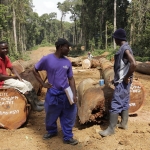COLOMBIA: Colombia seeks extradition of 8 people in Chiquita payments to terrorists
Colombia's chief prosecutor said Tuesday he will demand the extradition of eight people allegedly involved with Chiquita's payments to right-wing paramilitaries and leftist rebels in a region where it had profitable banana-growing operations.
The prosecutor also said in an interview with local RCN radio that his office had opened a formal investigation into allegations that Alabama-based coal producer Drummond Co. Inc. collaborated with paramilitaries to kill union members.
A civil lawsuit in the U.S. makes similar allegations, which the company has denied.
Chiquita Brands International pleaded guilty Monday in U.S. federal court to one count of doing business with a terrorist organization. The plea is part of a deal with prosecutors that calls for a $25 million fine and does not identify the several senior executives who approved the illegal protection payments.
The agreement ended a lengthy Justice Department investigation into the company's financial dealings with right-wing paramilitaries and leftist rebels the U.S. government deems terrorist groups.
Prosecutors say the Cincinnati-based company agreed to pay about $1.7 million between 1997 and 2004 to the United Self-Defense Forces of Colombia, known as AUC for its Spanish initials.
The AUC has been responsible for some of the worst massacres in Colombia's civil conflict and for a sizable percentage of the country's cocaine exports. The U.S. government designated the AUC a terrorist group in September 2001.
In addition to paying the AUC, prosecutors said, Chiquita made payments to the National Liberation Army, or ELN, and the leftist Revolutionary Armed Forces of Colombia, or FARC, as control of the company's banana-growing area shifted.
Chiquita has said it was forced to make the payments and was acting only to ensure the safety of its workers.
But federal prosecutors noted that from 2001 to 2004, when Chiquita made $825,000 in illegal payments, the Colombian banana operation Banadex earned $49.4 million and was the company's most profitable unit.
In 2001, a Banadex ship was used to unload 3,000 rifles and thousands of rounds of ammunition for the paramilitaries, which were officially listed as a "terrorist organization" by the U.S. government two months earlier.
"They should be judged in Colombia, not only for the extortion payments, but also for the transport and safekeeping of 3,000 rifles," chief federal prosecutor Mario Iguaran told RCN radio.
Iguaran did not identify the people he hopes to extradite, and the U.S. complaint did not identify anyone by name - it simply said that 10 people working for Chiquita or its Banadex subsidiary were involved in the illegal payments.
Chiquita spokesman Mike Mitchell declined to discuss the eight people that Colombia wants extradited, noting the Justice Department complaint "names no individuals, and no individuals have been charged."
"As we have previously noted, Chiquita voluntarily disclosed to the Department of Justice and Chiquita also informed the Colombian government of the situation and the payments almost three years ago," Mitchell said.
Iguaran said the arms were used by the paramilitaries to push leftist rebels out of the zone in northern Colombia where Chiquita had its banana plantations.
Chiquita sold Banadex, its Colombian subsidiary, in June 2004 for around $43.5 million.
Meanwhile, Drummond officials did not immediately return calls seeking comment.
"In the case of Drummond, there's a formal investigation. The investigation is well-advanced. Still, a decision has yet to be made," said Iguaran.
A Colombian union, Sintramienergetica, sued Drummond in 2002 in Birmingham, Ala., with help from the United Steelworkers of America, blaming the company for the paramilitary killings of three union leaders at the company's mine in northern Colombia in 2001.
"What we're seeing is some private business that recruit the (paramilitaries), aware of their conduct, to kill," said Iguaran.
Both companies have operated along the northern coast, long a paramilitary stronghold. Colombia is now in the midst of its worst political crisis in decades as evidence emerges of a symbiotic pact between politicians and the paramilitaries, in which the militias intimidated voters into supporting certain candidates in return for cuts of public contracts.
- 181 Food and Agriculture



